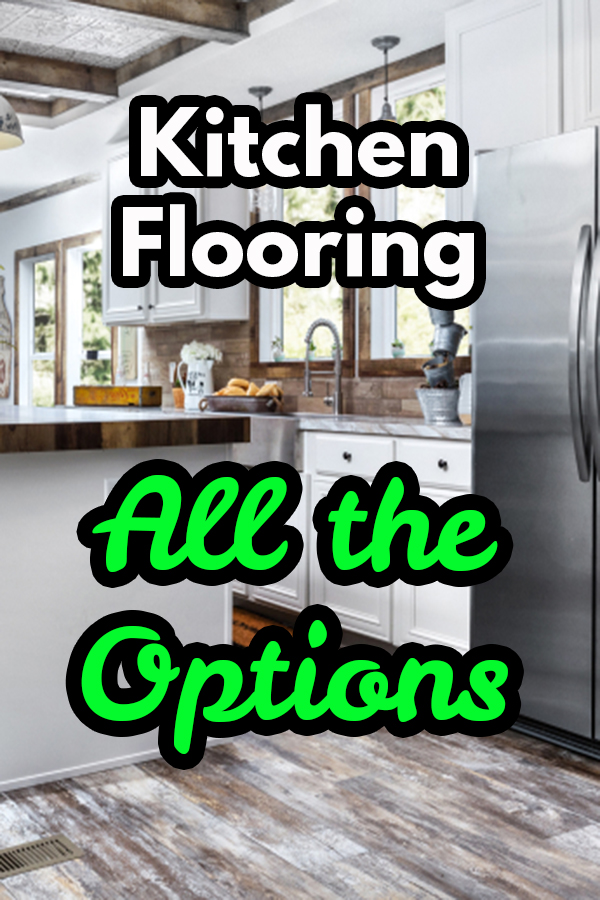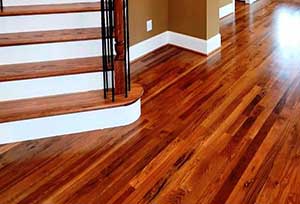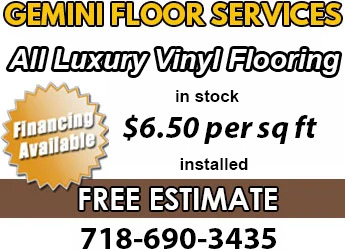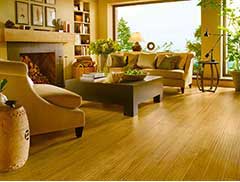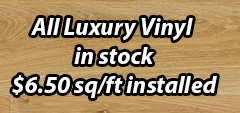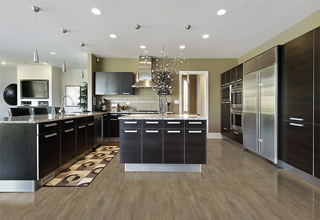 What is the best flooring for kitchens ? That all depends on the budget and preference of style & performance. Today there’s many types of flooring suitable for kitchens. The flooring materials most often recommended are stone, porcelain, ceramic, hardwood & vinyl. Other good recommendations are laminate, engineered wood & cork.
What is the best flooring for kitchens ? That all depends on the budget and preference of style & performance. Today there’s many types of flooring suitable for kitchens. The flooring materials most often recommended are stone, porcelain, ceramic, hardwood & vinyl. Other good recommendations are laminate, engineered wood & cork.
The most durable & elegant materials like natural stone, hardwood & porcelain will generally be the most costly. The costs of other less expensive flooring materials including installation are all relatively comparable. Final costs can vary widely according to the location, square footage, material grade, sale prices & many other factors.
But any of these flooring materials will provide adequate water resistance, durability & be easy to clean. Just sweep & mop. All these kitchen flooring choices are available in many colors & styles. The choices can seem overwhelming, so let’s go over each of these to help you decide which works best for you.
Ceramic & Porcelain Tile
Cork
Engineered Wood
Hardwood
Laminate
Stone
Vinyl
Ceramic & Porcelain Tile Flooring for Kitchens
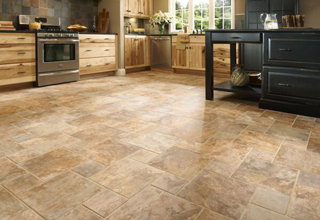 Ceramic & porcelain tile is a very common flooring for kitchens & especially bathrooms. Both types of tile are very similar being made of baked natural clay. Tiles are extremely durable & can last a lifetime. Glaze on the surface seals out water when tiles are properly grouted & sealed. They come in many styles & colors, sizes & shapes, patterns & mosaics. There’s even tiles that mimic stone & wood. Tiles are low maintenance – simply vacuum & damp mop. Grout though can require resealing every 3-4 years. Porcelain is usually higher priced than ceramic. It’s harder & has even greater crack & stain resistance. But it’s significantly less costly than stone & easier to clean. Stone replicated ceramic & porcelain are great alternatives to stone.
Ceramic & porcelain tile is a very common flooring for kitchens & especially bathrooms. Both types of tile are very similar being made of baked natural clay. Tiles are extremely durable & can last a lifetime. Glaze on the surface seals out water when tiles are properly grouted & sealed. They come in many styles & colors, sizes & shapes, patterns & mosaics. There’s even tiles that mimic stone & wood. Tiles are low maintenance – simply vacuum & damp mop. Grout though can require resealing every 3-4 years. Porcelain is usually higher priced than ceramic. It’s harder & has even greater crack & stain resistance. But it’s significantly less costly than stone & easier to clean. Stone replicated ceramic & porcelain are great alternatives to stone.
- Baked clay & shale
- All natural, very ecofriendly
- Hygienic- resists mold & allergens
- No VOC’s
- Water resistant, (Porcelain is used for shower stalls)
- Highly resistant to humidity
- Available in wide varieties
- Installs over Plywood, concrete or 1 layer of vinyl
- Not easy to install, remove or replace, best done by professional
- Installs with adhesive & mortar
- Can be floated w/tile trays, over all but carpet
- Very easy to clean
- Very low maintenance – sweep, vacuum, mop, refinish periodically
- Indoor & outdoor, install anywhere including bath & exterior areas
- Can be refinished & reglazed, can be painted
- Permanent baked in color-no fading
- High durability, especially porcelain
- Child & pet durable but hard & can get cold
- Grout can stain, needs to be glazed periodically
- Good scratch resistance, especially porcelain
- Lifespan: Ceramic – 50 years, Porcelain – lifetime with proper install & care
- Ideal for radiant heat
- Increases resale value
- Most have 3-10 years warranty
- Tile is hard & can get cold, being not as comfortable to stand on without a mat or shoes
- Hardness can cause dropped glasses or dishes to shatter
- Ceramic tiles especially need a solid subfloor not prone to movement as this can cause cracks
- Tiles can be slippery when wet, look for non textured & non slip tiles if that’s a concern
Cork
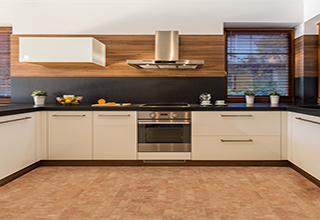 Cork is budget & eco friendly natural flooring made of tree bark. The bark is harvested & renewed without cutting the trees. It’s slip resistant, moisture resistant & offers good sound insulation making it a great choice of flooring for kitchens. Cork floors are soft & warm on the foot. There’s no worries about shattered glass when a dish or glass drops. Mostly stain resistant, though wine spills need to be cleaned up quickly. Cork comes in easy DIY planks or tiles that snap together, glue down or are peel & stick. Several shades of color are available. Another nice feature is it can be sanded & refinished like wood to look new again.
Cork is budget & eco friendly natural flooring made of tree bark. The bark is harvested & renewed without cutting the trees. It’s slip resistant, moisture resistant & offers good sound insulation making it a great choice of flooring for kitchens. Cork floors are soft & warm on the foot. There’s no worries about shattered glass when a dish or glass drops. Mostly stain resistant, though wine spills need to be cleaned up quickly. Cork comes in easy DIY planks or tiles that snap together, glue down or are peel & stick. Several shades of color are available. Another nice feature is it can be sanded & refinished like wood to look new again.
- All natural except for adhesive, check voc ratings
- Warm & soft on foot, insulates
- Ecofriendly, sustainable source, very hygienic- resists mold & allergens
- Install on level plywood or concrete subfloor
- Install indoor in dry controlled climate, including basements
- Available in easy DIY peel & stick or click lock for easy installation, also can be glued down
- Float over any material except carpet
- Wide variety prefinished & unfinished
- Water resistant when finished; site finish floor for best protection
- Very durable & stain resistant if high quality finish
- Easy to clean (like hardwood)
- Easy to maintain; broom, vacuum, dry spills ASAP, reseal 1-5 years, refinish 5-7 years
- Can puncture or scratch but a good finish protects
- Not difficult to replace cork tiles
- Can’t change color but can be painted
- Heavy furniture can scratch or leave dents, though dents may eventually go away
- Excess sun can cause fading so shades or curtains are recommended if there’s much sun exposure.
- High humidity can cause to swell or curl
- Can last up to 50+ years
- Insulates & reduces sound
- Suitable for radiant heat
- Can increase home value being eco friendly, warm, durable
- Most offer 15 years warranty
- Pet urine & claws can damage
- May need resealing about every 4 years
Engineered Wood Flooring for Kitchens
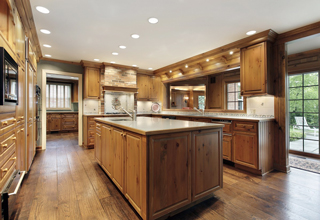 Engineered wood is a type of hardwood flooring that has a top layer of hardwood adhered to a plywood base. It’s appearance is exactly as hardwood since the top layer is real hardwood. It’s construction makes it more resistant to humidity, warping & gaps than solid hardwood. Yet it is less costly than hardwood, though still not the cheapest option. Engineered wood is available in all the same species & varieties as hardwood. It comes prefinished or unfinished. It’s easy to install yourself as a floating floor using click-lock boards. Engineered wood can also be installed with nails, staples or glue.
Engineered wood is a type of hardwood flooring that has a top layer of hardwood adhered to a plywood base. It’s appearance is exactly as hardwood since the top layer is real hardwood. It’s construction makes it more resistant to humidity, warping & gaps than solid hardwood. Yet it is less costly than hardwood, though still not the cheapest option. Engineered wood is available in all the same species & varieties as hardwood. It comes prefinished or unfinished. It’s easy to install yourself as a floating floor using click-lock boards. Engineered wood can also be installed with nails, staples or glue.
- Composed of a top layer of solid hardwood adhered to plywood base
- Surface appears same as solid hardwood
- All natural except for adhesive
- Humidity resistant , DIY install on any type of subfloor
- Most products not as long lasting as hardwood
- Wide variety prefinished & unfinished
- Install on plywood, concrete, any type of old but level floor
- Easy to install as click-lock floating floor
- Can install with DIY Click-lock, tongue & groove, nail, staple or glue
- Float over any material except carpet
- Easy to clean, dry up spills ASAP
- Easy to clean & maintain; must take care to avoid scuffs & scratches, broom, damp wipe
- Install on any covered area including below ground basements
- Highly resistant to humidity; doesn’t warp, but standing water can cause damage
- Onsite finishing helps increase water resistance but spills should still be cleaned ASAP
- Very hygienic- resists mold & allergens
- Low quality products can have VOC issue
- Some engineered wood products can be sanded & refinished, it depends on thickness of top layer
- Mostly less long lasting than hardwood
- Pet urine & claws can damage
- Can fade with high sun exposure; depends on quality of finish
- Wood with strong grain hides scratches
- Life expectancy: Lower quality 20 –30 years/ high quality 40-80 years
- Offers sound proofing on floating floors with a sound barrier
- More suitable for basements than solid hardwood
- If certified by FSC or SFI;
- Hard & solid underfoot, can get cold (good for radiant heat)
- Available in planks 2.25”-7” wide x 12”-85” long
- 8mm-15mm minimum thickness of top layer hardwood is most important for longevity
- Many are suitable for radiant heat
- Can increase resale value as it appears like solid hardwood
- Some warranties are 25-50 years w/proper install & moisture level
- Great flooring for kitchens
more about engineered wood flooring…
Hardwood Flooring for Kitchens
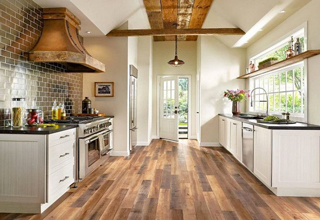 The classic look of hardwood is a popular flooring for kitchens. It’s less costly than stone but more then ceramic. A main advantage of wood is it can be color changed & renewed by refinishing. Hardwood is durable and can last a lifetime. While hardwood is not considered waterproof, a proper finish will protect wood from water stains. Still moisture should always be cleaned up promptly. While prefinished wood is easier to install, site finishing seals between every board thus offering greater moisture protection.
The classic look of hardwood is a popular flooring for kitchens. It’s less costly than stone but more then ceramic. A main advantage of wood is it can be color changed & renewed by refinishing. Hardwood is durable and can last a lifetime. While hardwood is not considered waterproof, a proper finish will protect wood from water stains. Still moisture should always be cleaned up promptly. While prefinished wood is easier to install, site finishing seals between every board thus offering greater moisture protection.
- 100% natural wood: Oak, Maple, Hickory, Cherry, Walnut..
- Refinish about every 7-10 years
- Can refinish & color change many times, classy looking
- Can be damaged by moisture, must be finished for protection
- Should be professionally installed
- Wide variety prefinished & unfinished
- Install on plywood for ¾” planks, on plywood or concrete (not below ground) for 5/16”
- Prefinished possible to DIY/ site finished needs pro install
- Install types: Tongue & groove: Nail, staple or glue down
- Not recommended for floating floor installation
- Easy to clean, dry up spills ASAP
- Easy to maintain ;must take care to avoid scuffs & scratches
- Broom, damp wipe, dry spills ASAP, refinish every 7-10 years
- Install in indoor controlled climate, dry
- Standing water can damage; site finish protects
- High humidity can cause gaps & warping
- Very hygienic- resists mold & allergens
- Use water based finish for best air quality
- Can be refinished many times
- Color can be changed when refinishing
- Mostly very durable, depends on wood species
- Pet urine & claws can damage
- Easy to repair minor damage; can replace damaged section
- Easy to clean
- Finish helps but spills should be cleaned ASAP
- Can fade; depends on finish
- Wood with strong grain hides scratches
- Can last a lifetime: 70-100 years
- Not sound proof like floating engineered floor
- Great for bedroom, living, dining rooms, kirchen; areas of low moisture or humidity
- Hard & solid underfoot, can get cold
- Comes in 1.5”- 8” wide x 48”-84” long planks
- For in floor heating systems only certain woods are suited like ash, cherry, maple & oak
- Increases resale value
- Some warranties are 25-50 years w/proper install & moisture level
Laminate
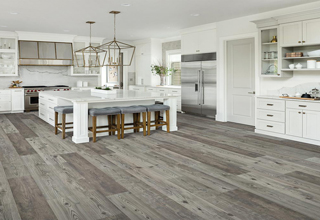 Laminate is made of fiber board covered with a photograph layer & protective finish. The main advantages of laminate are it’s affordability, easy installation, low maintenance & resemblance to costlier natural materials like hardwood, stone & tile. Laminate can actually cost a fraction in comparison yet look just like the real thing. Laminate is generally less water resistant than other materials. However there are newer products now with a more water resistant core.
Laminate is made of fiber board covered with a photograph layer & protective finish. The main advantages of laminate are it’s affordability, easy installation, low maintenance & resemblance to costlier natural materials like hardwood, stone & tile. Laminate can actually cost a fraction in comparison yet look just like the real thing. Laminate is generally less water resistant than other materials. However there are newer products now with a more water resistant core.
- Can increase resale value as it can appear like solid hardwood, stone, ceramic, tile, concrete
- Composed of a photographic & wear layer over dense fiber board
- Is both natural & synthetic as it has adhesive
- Very low maintenance, just sweep, vacuum, sponge wipe, avoid spills sitting – standing water can damage
- High humidity can cause to swell or warp
- Some laminate products are labeled as waterproof or water resistant, though the effectiveness varies
- Very stain resistant
- Highly resists scuffs, scratches, stains
- Affordable, easy to install
- VOC’s possible, check air quality/voc ratings
- Install in any indoor controlled climate, dry area, above or below grade
- Installs on any hard, flat surface (not carpet), can be floated over any material
- Easy DIY install as a click-lock floating floor.
- Can be installed as (No glue) click lock, glued ton-gue & groove or lock & fold
- Very hygienic- resists mold & allergens
- Can’t be refinished
- Can’t change color but can be painted
- Hard surface like wood, not resilient, but stands up to rough play & claws
- Easy to replace planks
- The best laminates can be even more UV resistant than wood
- The best laminates can even resist scratches better than wood
- Life expectancy of 10-30 years, most last 15-25
- Is sound proof on a floating floor with sound underlayment
- Somewhat environmentally friendly as no trees are cut but material is non recyclable
- Comes in Tiles, or Planks Length: 47″-49″ Width: 5″-7″
- Many laminate products are suitable for radiant heat
- 15-30 year warranties common
Stone
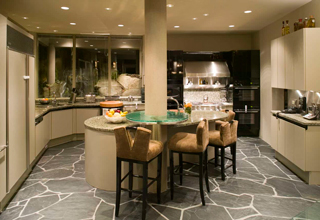 Stone is a popular choice for kitchen. It’s natural, durable, hygienic & low maintenance. It is however expensive & not easy to install, definitely not a do it yourself job for the inexperienced. Stone is waterproof yet it still needs periodic sealing to protect from stains. Like hardwood it adds value to your home. Lower quality stone can chip while high quality is extremely durable & can last a lifetime. Marble, slate, granite, limestone & travertine are some common types. Keep in mind that highly polished stone surfaces can be slippery when wet.
Stone is a popular choice for kitchen. It’s natural, durable, hygienic & low maintenance. It is however expensive & not easy to install, definitely not a do it yourself job for the inexperienced. Stone is waterproof yet it still needs periodic sealing to protect from stains. Like hardwood it adds value to your home. Lower quality stone can chip while high quality is extremely durable & can last a lifetime. Marble, slate, granite, limestone & travertine are some common types. Keep in mind that highly polished stone surfaces can be slippery when wet.
- All natural, durable, hygienic, low maintenance
- Expensive, hard to install/remove, grout can stain if not sealed
- Install on plywood, concrete or 1 layer of vinyl
- Not easy to install, best done by professional
- Installs with dhesive, mortar
- Can be floated w/tile trays, over all but carpet
- Very easy to clean
- Very low maintenance
- Sweep, mop, vacuum, reseal periodically
- Indoor & outdoor
- Install anywhere including bath & exterior areas
- Resists water but must be sealed every 3-5 years
- Resists humidity – must be sealed every 3-5 years
- very hygienic- resists mold & allergens
- No VOC’s
- Can be polished, refinished & resealed
- Can’t change color but can be painted
- Some stone is the most durable type of flooring
- Not easy to replace adhered tiles
- Easy to clean
- Stain resistant if grout & stone are sealed
- Some types can fade
- Some extremely scratch resistant: Granite,marble, slate
- Appearance often improves with age
- Can last lifetime with proper installation & care
- Sound proof on floating floor with sound underlayment
- Very ecofriendly
- Hard underfoot, can get cold
- Ideal for radiant heat
- May or may not help increase resale value
- Most comes with 3-10 years warranty
more about stone & tile flooring…
Vinyl Flooring for Kitchens
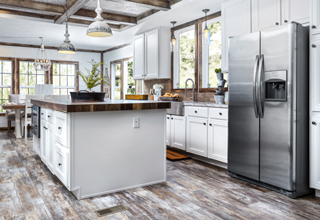 Vinyl is generally the most budget friendly flooring choice on this list. It’s warm & soft on the foot. There’s a vast variety of choices in vinyl which range from the least expensive peel & stick tiles you might find at a dollar store up the more thick, durable & costly luxury vinyls (LVT – luxury vinyl tile & LVP – luxury vinyl plank).
Vinyl is generally the most budget friendly flooring choice on this list. It’s warm & soft on the foot. There’s a vast variety of choices in vinyl which range from the least expensive peel & stick tiles you might find at a dollar store up the more thick, durable & costly luxury vinyls (LVT – luxury vinyl tile & LVP – luxury vinyl plank).
Vinyl is at minimum very water resistant & some are fully waterproof. Sheet vinyl is especially water resistant since it has no seams for water to penetrate. Vinyl can look like real wood & stone but is much less costly, doesn’t add value to a home & is not as long lasting. Low end vinyl averages a 10-20 years lifespan, while higher quality luxury vinyl can last 20-40 years.
Vinyl is easy to install & comes in several install types like peel & stick, snap together & glue down. There’s also several vinyl products composed of different materials such as Engineered Vinyl, Wood Plastic Composite (WPC) & Stone Plastic Composite (SPC). Vinyl is not considered eco friendly as it’s made of pvc plastic and can emit VOC’s, especially cheap stuff. Look for products that offer air quality certifications.
- Very low maint costs, sweep, vacuum, sponge wipe, cleaner
- Very durable, easy to install & remove, vast selection
- VOC’s possible,look for air quality certified products
- Vinyl can get gouged (but it’s easy to replace tiles)
- Wide variety of replicated stone, ceramic, wood, tile, concrete
- Installs on any hard, flat surface (not carpet)
- Easy DIY install with click-lock or adhesive
- Click lock installs can be floated
- Install types: click lock, vinyl adhesive, peel & stick, glue down
- Float over any material except carpet
- Easy to clean
- Very low maintenance
- Sweep, vacuum, mop
- Install in Indoor controlled climate, dry
- Water resistant, good for kitchen, bathroom, basement
- Highly resistant to humidity
- Very hygienic- resists mold & allergens
- Some luxury vinyl can be refinished
- Can’t change color but can be painted
- Very durable, especially luxury vinyl
- Easy clean, resists spills, stains, resilient
- Easy to repair, replace tiles
- LVT is ery UV resistant
- Protective layers on LVT highly resistant to scratches
- Lifespan: low end 10-20 years, high end 20-40 years
- Foam or cork underlayment reduces sound
